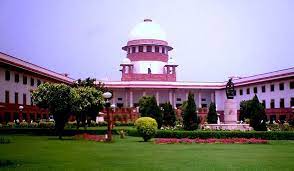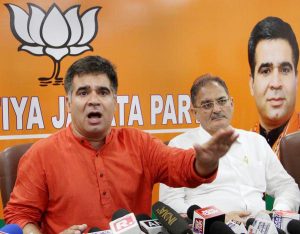
Supreme Court rules that J&K cannot claim Sovereignty after accession to India
Jammu & Kashmir cannot claim sovereignty independent of the Union of India after the erstwhile princely state acceded to the country, the Supreme Court observed on Thursday, adding it is a “very, very difficult proposition to accept” that Article 370 was a permanent feature wresting a vestige of sovereignty with the J&K legislative assembly.
According to a Constitution bench headed by Chief Justice of India (CJI) Dhananjaya Y Chandrachud, the integration of J&K with the country was “absolutely complete” as soon as Article 1 of the Indian Constitution came into force, declaring it to be a part of the Union of India and therefore, no questions could now be raised regarding the “complete merger” of J&K.
On the fifth day of the arguments in a batch of petitions that have challenged the August 2019 abrogation of Article 370 and the revocation of J&K’s special status, the five-judge bench emphasised that distribution of legislative powers, or a restriction on the Centre to frame laws on certain subjects or in some states, does not affect the fact that sovereignty rests only with the Union of India.
“One thing is very clear that the there was an unconditional surrender of sovereignty of J&K with India. The surrender of sovereignty was absolutely complete. Once sovereignty was absolutely and fully vested in India, the only restraint would be on power of Parliament to enact laws on certain subjects…merely because some fetters are on Parliament to frame laws with respect to the State List, does it mean that states retain their sovereignty? No,” said the bench, also comprising justices Sanjay Kishan Kaul, Sanjiv Khanna, BR Gavai and Surya Kant.
The bench, emphatically, added: “Once Article 1 says that India shall be a Union of States and that included the State of J&K, transfer of sovereignty was complete. We cannot read the post Article 370 Constitution as somehow a document which retains some elements of sovereignty in J&K.”
The court’s remarks came as senior counsel Zafar Shah, representing the Srinagar Bar Association, argued in favour of “constitutional autonomy” in favour of J&K, contending that the erstwhile Valley state acceded to India but never completely integrated or merged but rather kept its autonomy intact through Article 370.
Claiming that J&K could not be put on par with any other state that merged with India, Shah submitted that Article 370 could not have been done away with since it required the concurrence of the Constituent assembly of J&K, which, he said, does not exist anymore and was the only machinery to do so.
Shah’s submissions, however, prompted the bench to point out that the intention of the framers of the Indian Constitution could be gathered from the placement and the language of Article 370 since it was referred to as a “temporary” provision and even talked about the procedure to abrogate it.
“Framers themselves envisaged that it could cease to exist some day…Therefore, to say that Article 370 has acquired a permanent status is something that would be…a very, very difficult proposition to accept. Suppose the state itself says that we want all laws to apply. Then where does 370 go? Then we really come back to the process. Was this process permissible or not? And we can examine that,” it observed.
To this, Shah suggested that the complete integration of J&K with India could have been done only by doing away with Article 370. But the bench retorted that the “complete integration” was done the moment Article 1 of the Indian Constitution included J&K as a part of the Union of India.
“The integration has already taken place as per Article 1. What is superior? The Constitution of India or the Instrument of Accession? Restraints on power to enact legislation are implicit in the scheme or the frame of the constitution…because we don’t have a unitary State. But does that retract from sovereignty? No. It’s just a fetter on Parliament,” it said.
The bench added: “Concurrence is not something unique only to the relationship with J&K. There are various shades of concurrence required in the Constitution. But that does not reflect upon the sovereignty of the Union…Our notions of parliamentary exclusion from states have been an evolving exercise. But one thing is clear, sovereignty was ceded completely to the Union of India.”
Referring to the amendment in Article 248 in 1972, the court pointed out that even before the August 2019 abrogation, Article 248 was amended in relation to its application to J&K to hold that Parliament has exclusive powers to make any laws on prevention of activities towards disrupting sovereignty of India.
“It contains an absolutely clear and unequivocal acceptance of sovereignty of India…So, no vestige of sovereignty was retained post the Instrument of Accession…There are provisions in the Constitution which apply with concurrence of states also. See Article 249. Concurrence of state is required if the Union wants to make laws in the State List. Look at Article 248…Parliament can do nothing in financial matters without a say of the states. But that does not mean sovereignty vests with the states,” it added.
Shah concluded his submissions on Thursday.
Senior counsel Rajeev Dhavan, appearing for another petitioner, commenced his arguments, and in his opening statements, attacked the division of J&K into two Union territories, calling it a constitutionally impermissible exercise. He added this was the first time when a state had been reduced to a UT. The hearing will resume on Tuesday next week.
A raft of petitions, filed by parliamentarians from the National Conference party, Kashmiri citizens, former bureaucrats and various organisations laid the challenge to the abrogation of Article 370 soon after the presidential order in August 2019.
While some petitioners brought up the requirement of consent from the Constituent Assembly for the abrogation of Article 370, others questioned the validity of the President’s Rule that was in effect when the abrogation was made. A few of these pleas went back to the Instrument of Accession, while some highlighted the Supreme Court’s ruling of 2018 that observed that Article 370 had gained a status of permanence. Many of these pleas also challenged the Jammu & Kashmir State Reorganisation Act, by which the state was bifurcated into two Union territories with effect from October 30, 2019.
On August 28, 2019, the Supreme Court issued notices on the pleas despite resistance from the central government, which argued that Article 370 had international and cross-border implications.
On July 3, the Supreme Court notified the setting up of a new Constitution bench, comprising its first five judges. A week later, the new bench directed that day-to-day hearing in the case would begin from August 2.

